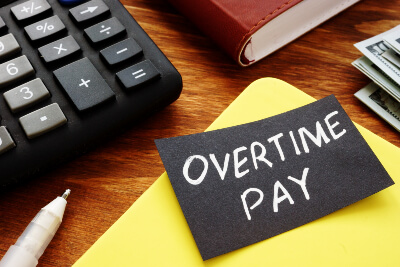 As an employee, no matter how much you love your job, it is doubtful that you would want to do work for free. That is why it is crucial to ensure your employer is paying you properly, including any overtime you may be owed. It has been reported that there are an estimated 82 million employees who are improperly paid in the United States each year, especially when overtime pay is involved.
As an employee, no matter how much you love your job, it is doubtful that you would want to do work for free. That is why it is crucial to ensure your employer is paying you properly, including any overtime you may be owed. It has been reported that there are an estimated 82 million employees who are improperly paid in the United States each year, especially when overtime pay is involved.
Lore Law Firm is an overtime pay law firm with extensive experience helping clients who have been improperly paid by their employers. To know if you are being correctly compensated for your work, you must understand overtime for day rate versus hourly employees.
What is the Difference Between Day Rate or Hourly Employees?
To understand what rate you should be paid for overtime, you need to know the difference between a day rate and an hourly employee.
- Day Rate Employees: A day rate employee is paid an agreed-upon amount for each day actually worked.
- Hourly Employees: These employees are paid an agreed-upon rate for each hour they work per day.
While many employers may claim that they do not have to pay day rate employees overtime, that is frequently not the case. The law still stands that, like hourly employees, if a day rate employee works more than 40 hours a week, they must be paid overtime. If your employer is refusing to pay you overtime pay that you are owed, you should ask why and contact an overtime pay lawyer who can review your specific situation and may be able to get you the financial compensation you are owed.
Understand the Overtime Rate for Day Rate Vs. Hourly Employees
Whether you are a day rate or hourly employee, it is crucial that you understand how overtime pay is calculated for each respective type of employment. Understanding the calculations will allow you to know better if your employer is giving you the proper compensation for any overtime you have worked. The overtime calculations for day rate and hourly employees is as follows:
- Day Rate Overtime Pay: To calculate the amount in overtime pay, multiply the day rate the employee is paid by the number of days worked in the week. Then divide that number by the total number of hours worked that week. The resulting number will be the employees’ regular rate of pay. The overtime premium owed will be half of the regular rate of pay. This is the additional amount the employee should be paid for each additional hour worked over 40 hours a week. So, for each overtime hour worked, the employee should receive their normal regular rate plus the additional half-time premium.
- Hourly Overtime Pay: Unless an employee receives additional compensation like commission pay, hazard pay or other non-discretionary incentives that must be factored in, the overtime rate for an hourly employee is half of their hourly rate of pay. That amount (plus their regular rate) should be paid to the employee for each additional hour they work over 40 hours a week.
If you are unsure how much you should be compensated for overtime work, contact an experienced overtime pay lawyer who may be able to help.
Contact an Overtime Pay Lawyer for Help
It is vital that if you are putting in extra hours at your job, that you are being appropriately paid for those overtime hours. If you have been paid incorrectly for any overtime you have worked, contact our experienced overtime pay lawyers who may be able to help you get the compensation you are owed.
Lore Law Firm has over 25 years of experience helping clients get the compensation their employers owe them. We are dedicated to defending the rights of employees nationwide. We look forward to providing you with the award-winning representation you deserve as we help you pursue justice. To get started with your free and confidential claim review, contact us online or call (713) 782-5291.
